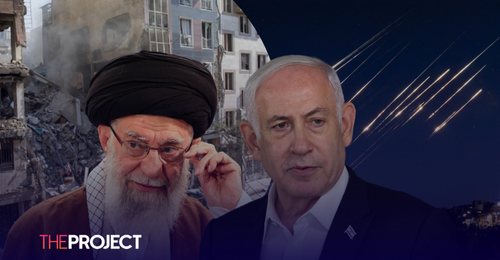Iranian missiles have struck Israel's Tel Aviv and the port city of Haifa, destroying homes and fuelling concerns among world leaders at this week's G7 meeting that the battle between the two old enemies could lead to a broader regional conflict.
Israeli media reported that three people were killed in the country's centre on Monday, while dozens more were wounded in the overnight strikes.
Search and location operations were underway in the northern city of Haifa, where around 30 people were wounded, emergency authorities said, as dozens of first responders rushed to the strike zones.
Fires were seen burning at a power plant near the port, media reported.
Live video footage also showed several missiles over Tel Aviv, and explosions could be heard there and over Jerusalem. Some residential buildings in Tel Aviv had been struck, Reuters witnesses said.
Tehran has launched several waves of attacks on Israel in retaliation for Israel's pre-emptive strikes targeting Iran's nuclear and ballistic missile programs that began on Friday.
Iran's Revolutionary Guards said the latest attack employed a new method that caused Israel's multi-layered defence systems to target each other.
"The initiatives and capabilities used in this operation, despite the comprehensive support of the United States and Western powers and the possession of the most up-to-date and newest defence technology, led to the successful and maximum hitting of the missiles on the targets in the occupied territories," it said.
At least 10 people in Israel, including children, were killed in earlier strikes, authorities said.
The death toll in Iran had reached at least 224, with 90 per cent of the casualties reported to be civilians, an Iranian health ministry spokesperson said.
Group of Seven leaders began gathering in the Canadian Rockies on Sunday, with the Israel-Iran conflict expected to be a top priority.
German Chancellor Friedrich Merz said his goals for the summit include for Iran not to develop or possess nuclear weapons, ensuring Israel's right to defend itself, avoiding escalation of the conflict and creating room for diplomacy.
"This issue will be very high on the agenda of the G7 summit," Merz told reporters.
Before leaving for the summit on Sunday, US President Donald Trump was asked what he was doing to de-escalate the situation.
"I hope there's going to be a deal. I think it's time for a deal," he told reporters.
"Sometimes they have to fight it out."
Iran has told mediators Qatar and Oman that it is not open to negotiating a ceasefire while it is under Israeli attack, an official briefed on the communications told Reuters on Sunday.
With AAP.





























